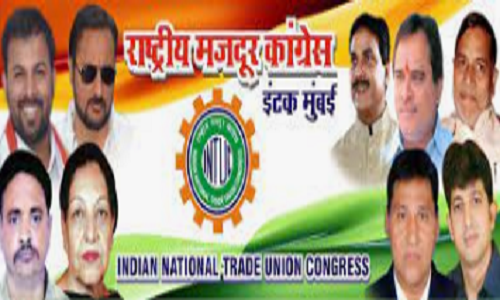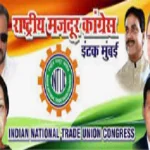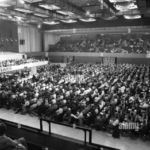Indian National Trade Union Congress working tirelessly to protect the interests of Indian workers through collective bargaining and legislative advocacy.
Table of Contents
Are you ready to dive into the vibrant world of Indian labor movements? Brace yourself for an exhilarating journey as we explore the power and influence of the Indian National Trade Union Congress (INTUC).
Steeped in a rich history that spans over 70 years, this iconic organization has been at the forefront of championing workers’ rights, social justice, and economic reforms.
From its inception during India’s struggle for independence to its present-day role as one of the country’s largest trade unions, INTUC has carved a formidable reputation for itself.
So fasten your seatbelts and get ready to uncover the fascinating story behind this dynamic force shaping India’s workforce!
The History and Purpose of Indian National Trade Union Congress
The Indian National Trade Union Congress (INTUC) has a rich history that dates back to its establishment on May 3, 1947.
Founded by prominent leaders such as Mahatma Gandhi and Jawaharlal Nehru, the INTUC played a pivotal role in India’s struggle for independence.
Its formation marked an important milestone in the fight against oppressive labor conditions and exploitation during the colonial era.
From its inception, the primary purpose of INTUC has been to champion the rights and welfare of workers across diverse industries in India.
It has consistently fought for better working conditions, fair wages, social security measures, and job security for all segments of society.
By mobilizing workers from various sectors and uniting them under a single umbrella organization, INTUC has effectively amplified their voices and influenced policy decisions at both national and state levels.
Today, it stands as one of the largest trade union federations in India with a strong presence across different states, enabling it to address pressing labor concerns on multiple fronts.
A notable aspect of INTUC’s history is its endeavor to foster solidarity among workers irrespective of their caste or religious affiliations.
This inclusive approach has allowed it to bridge divides within the workforce and create a united front against injustices prevalent in workplaces nationwide.
Moreover, INTUC actively advocates for gender equality in employment opportunities and positions within trade unions themselves.
Formation and Early Years: Struggles and Achievements
The formation of the Indian National Trade Union Congress (INTUC) marked a significant turning point in the history of India’s labor movement.
Established on May 3, 1947, the INTUC was born out of the need to address the unjust treatment and exploitation faced by workers across various industries.
In its early years, the INTUC faced numerous struggles as it fought against oppressive labor practices and worked towards ensuring fair wages and better working conditions for workers.
Despite these challenges, the organization achieved remarkable milestones during this period.
One of the notable achievements of INTUC during their early years was their successful campaign for an eight-hour workday.
The organization tirelessly advocated for shorter working hours to improve worker productivity and well-being.
With their persistent efforts, they were able to secure legislation that guaranteed an eight-hour workday in several industries, setting a precedent for improved labor standards nationwide.
This victory not only improved workers’ quality of life but also laid down a foundation for future advancements in worker rights.
Additionally, the formation of INTUC provided a platform for workers from different backgrounds to come together and unite against prevalent injustices.
This unity played a crucial role in achieving collective bargaining power with employers and bringing about positive changes in various sectors.
The formation of strong trade unions under INTUC helped empower workers by enabling them to negotiate better wages, improved safety measures, and other essential benefits.
Role in Workers’ Rights: Advocacy and Representation
Advocacy and representation play a crucial role in safeguarding workers’ rights within the Indian National Trade Union Congress (INTUC).
As a leading trade union organization in India, INTUC strives to address the various issues faced by workers and ensure that their rights are protected.
Through effective advocacy, INTUC works towards creating laws and policies that promote fair employment practices, safe working conditions, and equitable wages.
By representing the interests of workers at various forums such as government bodies, negotiating committees, and industry associations, INTUC can effectively voice concerns and bring about positive changes.
One of the fresh perspectives brought forth by INTUC’s advocacy efforts is the recognition of informal sector workers.
In India’s predominantly unorganized labor market, millions of workers lack access to basic benefits such as social security, health care facilities, or grievance redressal mechanisms.
Through its representation initiatives on behalf of these vulnerable sections of society, INTUC aims to bridge this gap and fight for equal opportunities for all workers.
This inclusive approach highlights the importance of advocating not just for formal sector employees but also addressing the needs and concerns of those employed in more precarious circumstances.
Moreover, another unique aspect where INTUC excels is making worker participation a central pillar of its advocacy campaigns.
Recognizing that collective action enhances bargaining power and leads to better outcomes for all involved parties while ensuring democratic decision-making processes are followed within trade unions.
This approach helps in building unity among workers from diverse backgrounds while enhancing their ability to negotiate with employers effectively.
Retirement Calculator Helps Workers
A Retirement Calculator can be an invaluable tool for workers planning their financial future. It helps individuals estimate how much money they will need to save for retirement based on their desired lifestyle, current savings, and expected income sources.
Using a Retirement Calculator is straightforward. Workers input various parameters such as age, salary, savings rate, and retirement age. The calculator then produces projections of future savings growth and potential retirement income.
One of the key benefits is that it allows users to visualize different scenarios. For instance, by adjusting retirement ages or contribution levels, workers can see how these changes affect their overall savings. This feature empowers individuals to make informed decisions about their financial strategies.
Additionally, many Retirement Calculators include factors such as inflation and investment returns, providing a more comprehensive picture of what to expect in retirement. With this information at hand, workers can identify any shortfall in their savings and take proactive steps to bridge the gap.
In conclusion, leveraging a Retirement Calculator not only aids in financial planning but also offers peace of mind as workers approach this critical life milestone. It encourages them to stay proactive about their futures and secure the retirement they envision.
Political Influence: Collaboration with Government and Opposition Parties
Political influence plays a crucial role in shaping the agenda and priorities of any trade union.
Collaboration with both the government and opposition parties can provide an opportunity for the Indian National Trade Union Congress (INTUC) to effectively advocate for workers’ rights and influence policy decisions.
By working closely with the ruling party, INTUC can seek favorable labor policies, secure funding for welfare programs, and ensure that workers’ concerns are addressed at the highest level.
Collaborating with opposition parties is equally important as it allows INTUC to challenge government policies that may be detrimental to workers’ interests.
This bipartisan approach enables trade unions like INTUC to maintain their independence while making meaningful contributions towards labor reform.
By engaging with opposition parties, investigations into unfair labor practices become feasible, giving a voice not only to union members but also amplifying worker rights issues on a larger scale.
Furthermore, such collaborations foster healthy democratic practices by ensuring a checks-and-balances system within the government machinery.
Challenges Faced: Internal Conflicts and External Criticisms
One of the major challenges faced by the Indian National Trade Union Congress (INTUC) is dealing with internal conflicts. Being a large organization representing various trade unions, there are often differences in opinions and agendas among the members.
These internal conflicts can sometimes escalate into disputes that hinder the smooth functioning of INTUC.
Moreover, another challenge faced by INTUC is external criticisms from various quarters.
As a powerful union, INTUC often finds itself at the center of attention and subject to scrutiny by media, political opponents, and even its own members.
This external criticism puts additional pressure on INTUC to be transparent in its operations and decision-making processes.
Internal conflicts can hinder the unity and effectiveness of any organization, let alone a large trade union like INTUC.
It is crucial for INTUC to find effective ways to manage these conflicts and promote healthy discussions among its members while ensuring that everyone’s voices are heard.
Similarly, receiving external criticisms should not discourage or weaken INTUC but rather act as an opportunity for self-reflection and improvement.
By addressing these challenges head-on, INTUC can continue fighting for workers’ rights and contributing towards a fairer labor environment in India.
Current Status and Future Outlook: Relevance in Modern India
The Indian National Trade Union Congress (INTUC) plays a significant role in shaping the current status and future outlook of India.
As the largest trade union federation in the country, INTUC has been at the forefront of fighting for workers’ rights, social justice, and economic reforms.
With its extensive membership base and strong organizational structure, INTUC holds considerable influence over labor policies and industrial relations in modern India.
Looking ahead, the relevance of INTUC in contemporary times cannot be overstated. The rapidly changing dynamics of India’s economy demand a nimble response from trade unions to protect workers’ interests effectively.
As technological advancements redefine industries and labor markets undergo fundamental transformations, it falls upon organizations like INTUC to ensure that workers are not left behind.
By adapting its strategies to embrace emerging sectors such as e-commerce and digital services while advocating for fair wages and decent working conditions, INTUC can safeguard the wellbeing of Indian workers amidst these evolving circumstances.
In conclusion, as India continues its journey towards economic growth and social development, the role of INTUC remains critical.
Being on the frontlines advocating for equitable treatment in workplaces across various industries, this trade union federation must navigate through ongoing challenges posed by globalization and technological disruptions with forward-thinking initiatives.
By doing so, INTUC can redefine itself as a force driving positive change within modern Indian society – enabling fairer opportunities for all workers while contributing to national progress.
Conclusion: INTC’s Contributions to Indian Labor Movement
In conclusion, the contributions of the Indian National Trade Union Congress (INTC) to the Indian labor movement cannot be underestimated.
Over the years, INTC has been at the forefront fighting for workers’ rights and improving their working conditions.
By organizing strikes, protests, and negotiations with employers, INTC has successfully created awareness about issues such as fair wages, job security, and workplace safety.
One of INTC’s notable achievements is its role in implementing the Minimum Wages Act in various sectors across India.
Through its persistent advocacy efforts, thousands of workers have benefitted from better pay and improved living standards.
Additionally, INTC has also played a vital role in raising awareness about child labor and fighting against its prevalence in different industries.
Furthermore, it is worth mentioning that INTC goes beyond addressing immediate issues; it actively works towards empowering workers by providing vocational training programs and education assistance.
This not only equips individuals with new skills but also helps uplift entire communities by breaking cycles of poverty.
Overall, INTC has proven to be a driving force behind significant improvements in the Indian labor movement.
Its continuous fight for workers’ rights serves as an inspiration for other organizations and individuals who seek to create lasting change in society.
As we move forward into a more progressive era where employee well-being is prioritized, it becomes crucial to acknowledge and appreciate the valuable contributions made by organizations like INTC towards building a fairer workforce.
FAQs:
1. What is the Indian National Trade Union Congress (INTUC)?
INTUC is one of the largest trade union federations in India, representing workers from various sectors across the country.
2. How does INTUC work towards protecting workers’ rights?
INTUC actively works to safeguard workers’ rights by advocating for better wages, improved working conditions, and social security benefits through negotiations with employers and policymakers.
3. Can anyone join INTUC?
Yes, any worker who wants to support the cause of workers’ rights can become a member of INTUC. It is open to all regardless of their occupation or industry.
4. Are there any membership fees associated with joining INTUC?
Yes, there are nominal membership fees that need to be paid annually to sustain the activities and campaigns conducted by INTUC.
5. Does INTUC provide any training programs for its members?
Absolutely! INTUC organizes various skill development and training programs to enhance the capabilities of its members and help them adapt to changing work environments.
6. How can I stay updated on INTUC’s latest activities and events?
You can stay informed about all the latest happenings by visiting our website regularly or following us on our social media platforms such as Facebook, Twitter, and Instagram.
7. Can INTUC assist me if I am facing workplace issues or unfair treatment?
Definitely! One of our primary objectives is to protect workers’ interests. If you are facing workplace issues or unfair treatment, reach out to us, and we will provide guidance and support accordingly.
8. Is it possible for me to contribute or volunteer with INTUC?
Absolutely! We welcome individuals who want to contribute their skills, time, or resources towards furthering the cause of workers’ rights in India. Contact us directly to explore volunteering opportunities within our organization.
Pros and Cons
Pros:
1. The Indian National Trade Union Congress (INTUC) provides a platform for workers to collectively voice their concerns, ensuring their rights and interests are protected.
2. INTUC has been instrumental in negotiating better wages, improved working conditions, and social security benefits for workers across various industries in India.
3. The union’s strong presence and bargaining power have led to the enactment of labor laws that safeguard workers’ rights and promote job security.
4. INTUC plays a significant role in fostering unity among workers, promoting solidarity, and supporting collective action to address common issues faced by the workforce.
5. The union actively engages in policy discussions with government bodies, advocating for worker-friendly legislations and policies.
Cons:
1. Critics argue that INTUC tends to be politically influenced or aligned with certain political parties, leading to biased decision-making on issues concerning workers’ welfare.
2. Some claim that INTUC’s focus is primarily on organized sector employees, potentially neglecting the rights and needs of unorganized sector workers who form a significant portion of the Indian workforce.
3. Internal conflicts within INTUC or disagreements over strategies can hinder effective representation of all workers’ interests and weaken the union’s overall impact.
4. Critics highlight instances where INTUC has failed








